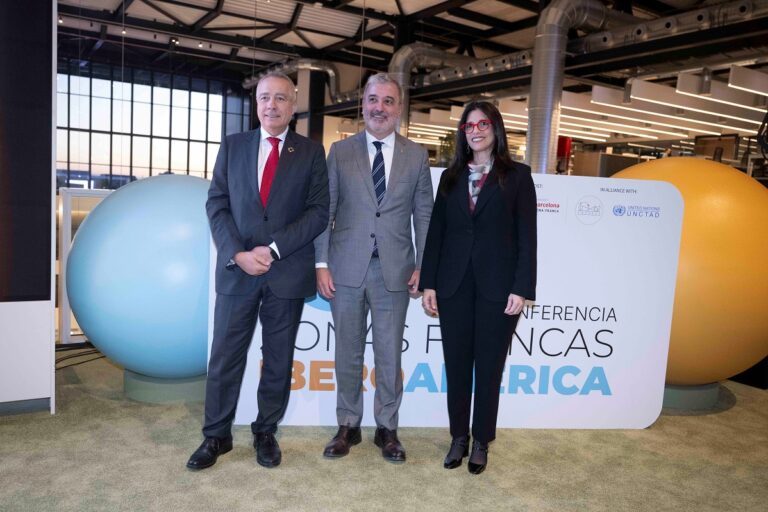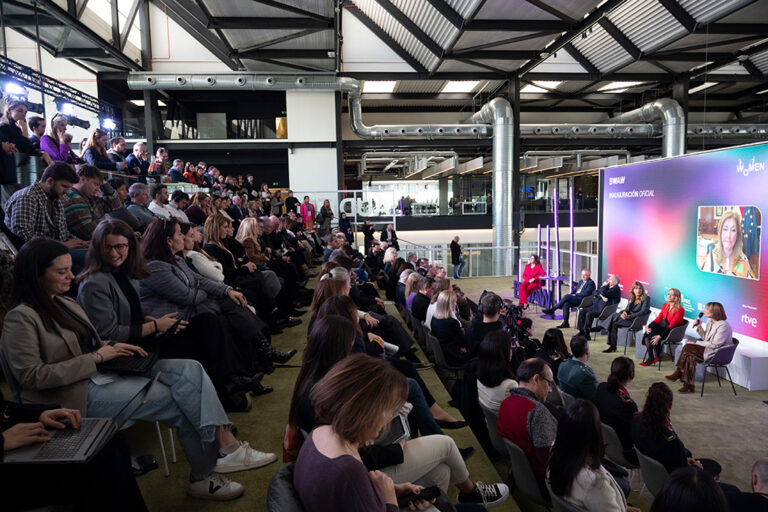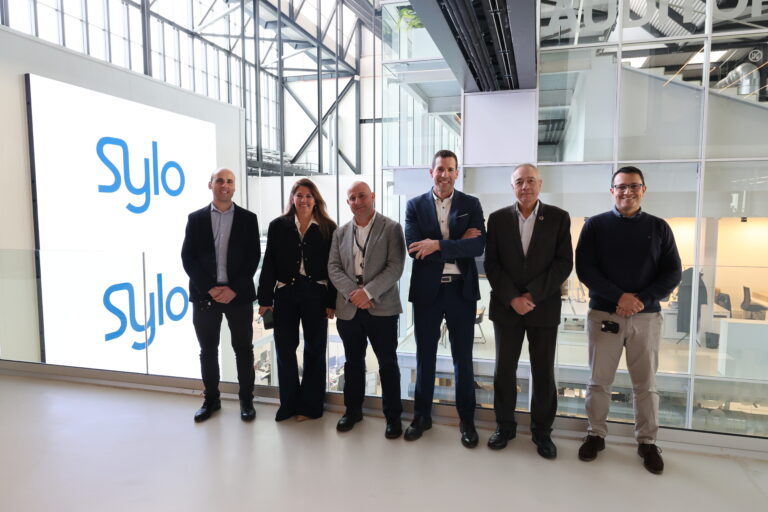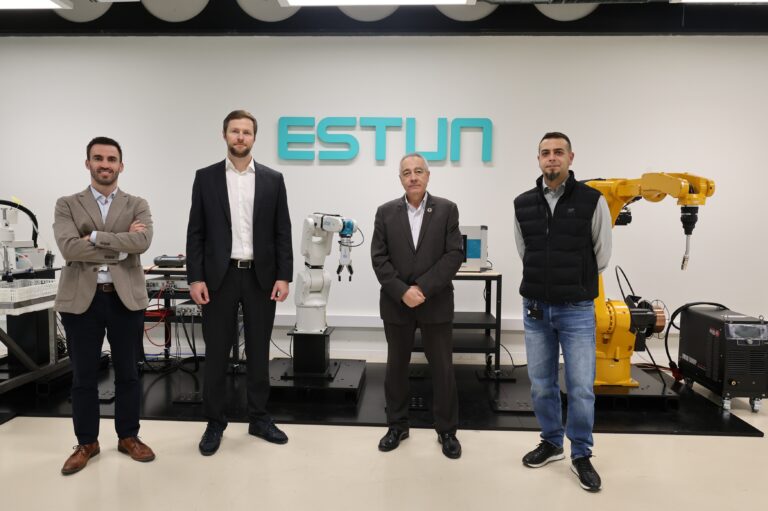Zona Franca de Barcelona is nominated as a benchmark in sustainable development by the international alliance GASEZ

9 de November de 2023
- The 26th Ibero-American Free Trade Zones Conference ends today with the GASEZ Conference, dedicated to the sustainability of free trade zones and the future strategic challenges of these zones with special emphasis on.
- The Global Alliance of Special Economic Zones (GASEZ), on its second general assembly in Barcelona, has announced the 50 most important model free zones in the world in relation to the fulfilment of the SDGs of the United Nations, where the activity of the Zona Franca de Barcelona stands out.
- DFactory Barcelona brought together 38 international speakers from 26 countries around the world in a total of 10 top-level sessions with more than 200 participants from Latin America, Europe and Africa.
Barcelona, 9 November 2023.- The XXVI Conference Ibero-American Free Trade Zones, promoted by the Free Zones Association of the Americas (AZFA) and the Consorci de la Zona Franca de Barcelona (CZFB), with the collaboration of the United Nations Conference on Trade and Development (UNCTAD) and the Global Alliance of Special Economic Zones (GASEZ), has today turned down the heel of its 26th edition at DFactory Barcelona, the technology hub led and promoted by the CZFB.
Inauguration of the 2nd General Assembly of GASEZ
In the framework of the Conference Ibero-American Free Trade Zones, the international association GASEZ has taken the opportunity to hold its second general assembly in Barcelona. The inauguration was attended by Claudia Pellerano, President of AZFA, James Zhan, Director of UNCTAD and Co-Chair of GASEZ, Samir Hamrouni, CEO of WFZO, and Blanca Sorigué, Director General of CZFB.
Claudia Pellerano, President of AZFA, stated that “Special Economic Zones are the centre of operations for job creation, knowledge and technology transfer to local regions and business promotion on a regional and international scale“. James Zhan, Director of UNCTAD, said: “There are many challenges that we must focus on together and work in alignment to articulate world-changing positions. We must be able to give our voice as key players in Special Economic Zones around the world“.
Samir Hamrouni, CEO of the WFZO, stated that “the initiatives carried out by the Free Trade Zones are not only about infrastructures, but also about development, learning, community, technology and innovation, sustainability among all the Special Economic Zones“. Blanca Sorigué, Director General of the CZFB and member of the AZFA Board of Directors, ended the inauguration by explaining that “at the Consorci de la Zona Franca de Barcelona we decided to commit to innovation, as here at the DFactory, where there are 30 companies that innovate and share all the projects we can imagine. And we are already working on its second phase. We want to be a great global hub for innovation and Industry 4.0, a District 4.0 that will generate bridges with other regions, as GASEZ is doing today. From the Zona Franca de Barcelona we are working to offer new opportunities for everyone every day“.
Barcelona Free Trade Zone as a model zone in relation to the SDGs
The highlight panel of the day was “GASEZ initiative to recognise the world’s top 50 Free Trade Zones in relation to the SDGs“, where the ongoing process and results of the GASEZ initiative to identify model zones for SDG compliance were presented. The aim of the initiative is to initiate, mobilise and recognise the efforts of the Special Economic Zones (SEZ) community to contribute to the United Nations Sustainable Development Goals (SDGs).
The Zona Franca de Barcelona stands out among the nominated free trade zones, which, thanks to its commitment to sustainable development, the promotion of investment in the SDGs and its social, environmental and governance standards, has made it onto the list of the 50 most important free trade zones in the world that are benchmarks in sustainable development. The Zona Franca Industrial Park currently has 300 companies installed on 6 million m2 of land, figures that endorse it as one of the largest and most active industrial areas in Spain. Known as the gateway to the European Union, it is oriented towards international business and with predominant sectors such as automotive, basic chemicals and logistics.
The session was moderated by Paul Wessendorp, Head of the Investment Promotion Section of the United Nations Conference on Trade and Development (UNCTAD), and featured international speakers Samir Hamrouni, CEO of the World Free Zones Organization (WFZO); Ahmed Bennis, Secretary-General of the Africa Economic Zones Organization (AEZO); Yuyan Song, Director-General of the Secretariat of the Green Partnership of Industrial Parks of China; Juan Torrents, president of FEMOZA; Martin Dovat, general manager of Zonamérica Uruguay; Cristina Andrés, Head of Marketing and Innovation at the Basque Country Technology Park and Rie Vejs-Kjeldgaard, Director of the Department of Sustainable Business, Productivity and Just Transition of the International Labour Organization.
In his case, Ahmed Bennis, Secretary General of the Africa Economic Zones Organisation (AEZO) stated that there are three challenges with respect to the SDGs to take into account: “Environmental responsibility, not to reduce CO2 but to develop housing and industrial parks and production plants; social inclusion among companies, since small and large companies are not benefiting from the installation of SEZs, an important challenge to work on, and finally technological investment in these zones, to encourage the exchange of technology, innovation and knowledge between SMEs in the regions and the SEZs“.
Yuyan Song, Director General of the Secretariat of the Green Partnership of Industrial Parks of China explained GPIP’s work over the past 5 years: “GPIP has been promoting both economic growth and ecological benefits to achieve green transformation, international cooperation and high-quality development for National Economic and Technological Development Zones and International Cooperation Industrial Parks”.
Finally, Martin Dovat, general manager of Zonamérica Uruguay presented his success story in Latin America: “Zonamérica Uruguay was created in 1990, with 90 hectares of land for industry and business. It is currently 70% developed and has more than 500 companies, with more than 7000 workers. We are applying SDGs in terms of energy, environment and governance. It is worth noting that we not only engage with the companies in the Economic Zone itself, but we also talk to the businesses involved in our activity outside our premises, which is important in relation to the economic development of the region“.
On this edition, Claudia Pellerano, president of AZFA, took the opportunity to present the medal “Alfonso Algara Person of the Year” to Mr. Juan Pablo Rivera, president of the Bogota Free Trade Zone. This award is presented annually to an outstanding personality for his or her leadership in the Free Trade Zone sector worldwide.
During the three days of celebration, DFactory Barcelona brought together 38 international speakers from 26 countries in more than 10 high-level sessions. The technology hub has been the epicentre of the global economic and logistics sector, where more than 200 participants from Latin America, Europe and Africa have been able to discuss the challenges of the industry. The B2B sector has taken advantage of the enclave to carry out high-quality networking, visit the capital and delve into the business fabric of Barcelona’s Zona Franca.
This 26th edition of the Ibero-American Free Trade Zone Conference culminates tomorrow with business visits by visitors and attendees at the Barcelona Supercomputing Center, the Logistics 4.0 Incubator promoted by the Consorci de la Zona Franca and the green hydrogen plant located in the city’s Zona Franca. At the end of the day, a video of Curaçao was shown inviting all participants to attend the next edition in 2024 in this country located in the Caribbean Sea.



